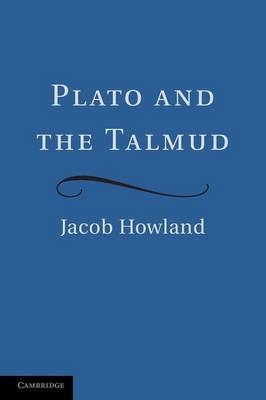
Plato and the Talmud
Seiten
2013
Cambridge University Press (Verlag)
978-1-107-61269-3 (ISBN)
Cambridge University Press (Verlag)
978-1-107-61269-3 (ISBN)
Sees the relationship between Athens and Jerusalem through the lens of the Platonic dialogues and the Talmud. Howland argues that these texts are animated by comparable conceptions of the proper roles of reasoned debate in religious life, and by an awareness of the limits of our understanding of things divine.
This innovative study sees the relationship between Athens and Jerusalem through the lens of the Platonic dialogues and the Talmud. Howland argues that these texts are animated by comparable conceptions of the proper roles of inquiry and reasoned debate in religious life, and by a profound awareness of the limits of our understanding of things divine. Insightful readings of Plato's Apology, Euthyphro and chapter three of tractate Ta'anit explore the relationship of prophets and philosophers, fathers and sons, and gods and men (among other themes), bringing to light the tension between rational inquiry and faith that is essential to the speeches and deeds of both Socrates and the Talmudic sages. In reflecting on the pedagogy of these texts, Howland shows in detail how Talmudic aggadah and Platonic drama and narrative speak to different sorts of readers in seeking mimetically to convey the living ethos of rabbinic Judaism and Socratic philosophising.
This innovative study sees the relationship between Athens and Jerusalem through the lens of the Platonic dialogues and the Talmud. Howland argues that these texts are animated by comparable conceptions of the proper roles of inquiry and reasoned debate in religious life, and by a profound awareness of the limits of our understanding of things divine. Insightful readings of Plato's Apology, Euthyphro and chapter three of tractate Ta'anit explore the relationship of prophets and philosophers, fathers and sons, and gods and men (among other themes), bringing to light the tension between rational inquiry and faith that is essential to the speeches and deeds of both Socrates and the Talmudic sages. In reflecting on the pedagogy of these texts, Howland shows in detail how Talmudic aggadah and Platonic drama and narrative speak to different sorts of readers in seeking mimetically to convey the living ethos of rabbinic Judaism and Socratic philosophising.
Jacob Howland is McFarlin Professor of Philosophy at the University of Tulsa. He is the author of Kierkegaard and Socrates: A Study in Philosophy and Faith (Cambridge University Press, 2006), The Paradox of Political Philosophy: Socrates' Philosophic Trial (1998) and The Republic: The Odyssey of Philosophy (1993). He also edited A Long Way Home: The Story of a Jewish Youth, 1939–1948, by Bob Golan (2005) and has published numerous articles.
Introduction: Athens and Jerusalem; 1. Talmudic and Platonic writing; 2. Rabbis and holy men; 3. Prophets and philosophers; 4. Fathers and sons; 5. Words and deeds; 6. Gods and men; 7. Miracles and necessity; Epilogue: tests and traditions.
| Erscheint lt. Verlag | 11.7.2013 |
|---|---|
| Verlagsort | Cambridge |
| Sprache | englisch |
| Maße | 152 x 229 mm |
| Gewicht | 440 g |
| Themenwelt | Geschichte ► Allgemeine Geschichte ► Vor- und Frühgeschichte |
| Geisteswissenschaften ► Philosophie ► Philosophie Altertum / Antike | |
| Geisteswissenschaften ► Religion / Theologie ► Judentum | |
| ISBN-10 | 1-107-61269-1 / 1107612691 |
| ISBN-13 | 978-1-107-61269-3 / 9781107612693 |
| Zustand | Neuware |
| Haben Sie eine Frage zum Produkt? |
Mehr entdecken
aus dem Bereich
aus dem Bereich
auf den Spuren der frühen Zivilisationen
Buch | Hardcover (2023)
C.H.Beck (Verlag)
20,00 €
Was Pompeji über uns erzählt
Buch | Hardcover (2023)
Propyläen (Verlag)
32,00 €


